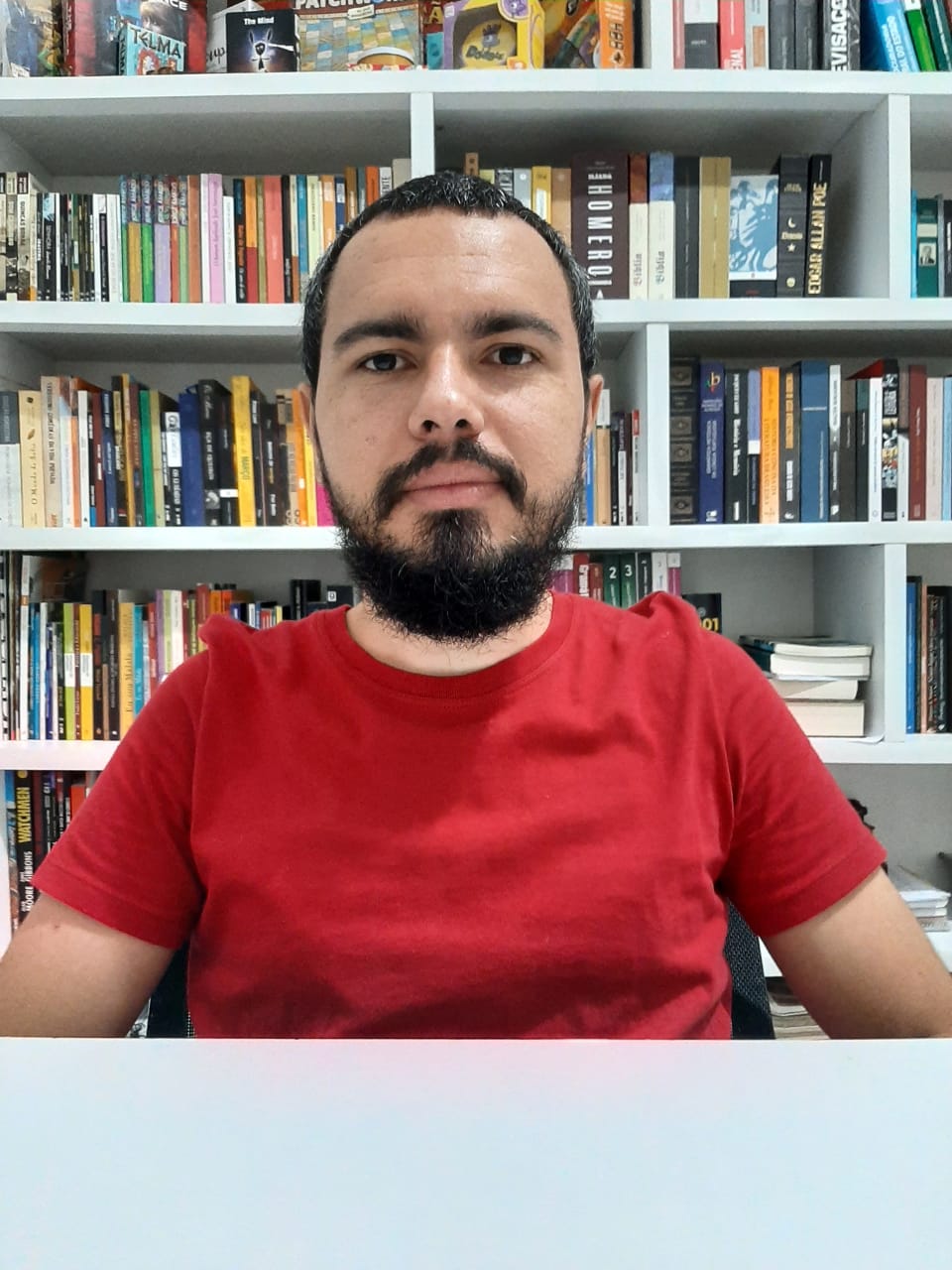A PERDA DA AUTORIDADE DO NARRADOR COMO RECURSO FORMAL NA REPRESENTAÇÃO DA VIOLÊNCIA EM K. – RELATO DE UMA BUSCA, DE BERNARDO KUCINSKI
DOI:
https://doi.org/10.20873/uft2179-3948.2021v12n1p102-117Palavras-chave:
Perda da autoridade do narrador, Violência, Teor testemunhalResumo
Este artigo defende a hipótese de que a obra K. – relato de uma busca, de Bernardo Kucinski, promove a perda da autoridade do narrador onisciente como recurso formal na representação da violência do regime militar de 1964-1985. Apontamos dois elementos estruturantes na obra: a autoridade do narrador e o teor testemunhal do romance. Para tanto, realizamos a verificação dos recursos estéticos utilizados na obra. A fim de compreender a relação entre autoridade, violência e poder, discutimos as ideias de Arendt (2016, 2020), Benjamin (1986) e Agamben (2004). Em interlocução com Seligmann-Silva (2008, 2010), cunhamos o conceito de “teor testemunhal” para entender a relação entre testemunho e ficção. Benjamin (2012) possibilitou uma leitura a contrapelo da narrativa, ao tempo em que também permitiu um olhar crítico sobre a história do progresso como acúmulo de catástrofes. Na análise do romance, verificamos que a perda da autoridade do narrador externo provoca uma percepção renovada das cenas de violências, pois, ao acompanhar a apresentação dos fatos sob a lente dos narradores em primeira pessoa, o leitor tem uma visão “de dentro” dos acontecimentos. A alternância de foco narrativo – ora externo, ora interno – também promove uma perspectiva multifacetada da representação da violência.
Downloads
Referências
ALMEIDA, Manuel Antônio de. Memórias de um sargento de milícias. São Paulo: Penguin; Companhia das Letras, 2013. Versão Kindle.
ARENDT, Hannah. Sobre a violência. Tradução de André de Macedo Duarte. 12. ed. Rio de Janeiro: Civilização Brasileira, 2020.
ARENDT, Hannah. Que é autoridade? In: Entre o passado e o futuro. Tradução de Mauro W. Barbosa. São Paulo: Perspectiva, 2016. p. 127-187.
BENJAMIN, Walter. Sobre o conceito da história. In: Magia e técnica, arte e política: ensaios sobre literatura e história da cultura. Tradução de Sérgio Paulo Rouanet, revisão técnica de Márcio Seligmann-Silva. 8. ed. rev. São Paulo: Brasiliense, 2012. p. 241-252.
BUARQUE, Chico. As caravanas. Compositor: Chico Buarque. Brasil: Biscoito Fino Produtora, 2017. 1 CD com 9 faixas.
CANDIDO, Antonio. Dialética da malandragem. In: O discurso e a cidade. 5. ed. Rio de Janeiro: Ouro sobre Azul, 2015. p. 17-47.
DELLASOPPA, Emílio E. Reflexões sobre a violência, autoridade e autoritarismo. Revista USP, São Paulo, n. 9, p. 79-86, 1991. Disponível em:< https://doi.org/10.11606/issn.2316-9036.v0i9p79-86>. Acesso em: 27 dez. 2020.
DUARTE, André de Macedo. Poder e violência no pensamento político de Hannah Arendt: uma reconsideração. In: ARENDT, Hannah. Sobre a violência. Tradução de André de Macedo Duarte. 12. ed. Rio de Janeiro: Civilização Brasileira, 2020. p.131-167.
KUCINSKI, Bernardo. K. – relato de uma busca. São Paulo: Cosac Naify, 2014.
LEVI, Primo. É isto um homem?. Tradução de Luigi Del Re. Rio de Janeiro: Rocco, 1988.
MAGRI, Milena Mulatti. Ficção, testemunho e ditadura militar brasileira. In: Imagens da ditadura militar brasileira em romances de Caio Fernando Abreu, Bernardo Carvalho e Milton Hatoum. 2015. 250f. Tese (Doutorado) – Faculdade de Filosofia, Letras e Ciências Humanas, Universidade de São Paulo, São Paulo, 2015. p. 37-49.
MARCO, Valeria de. A literatura de testemunho e a violência de estado. Lua Nova, São Paulo, n. 62, p. 45-68, 2004. Disponível em: <http://dx.doi.org/10.1590/S0102-64452004000200004>. Acesso em: 1 jan. 2021.
MBEMBE, Achille. Sair da grande noite: ensaio sobre a África descolonizada. Tradução de Fábio Ribeiro. Petrópolis: Vozes, 2019. Versão Kindle.
ORWELL, George. 1984. Tradução de Alexandre Hubner; Heloisa Jahn. São Paulo: Companhia das Letras, 2009.
PINHEIRO, Paulo Sérgio. Autoritarismo e transição. Revista USP, São Paulo, n. 9, p. 45-56, 1991. Disponível em: <https://www.revistas.usp.br/revusp/article/view/25547>. Acesso em: 2 jan. 2021.
SELIGMANN-SILVA, Márcio. A história como trauma. In: NESTROVSKI, Arthur; SELIGMANN-SILVA, Márcio (orgs.). Catástrofe e representação: ensaios. São Paulo: Escuta, 2000. p. 73-98.
SELIGMANN-SILVA, Márcio. O testemunho: entre a ficção e o “real”. In: SELIGMANN-SILVA, Márcio (org.). História, memória, literatura: o testemunho na Era das Catástrofes. Campinas: Editora da Unicamp, 2003. p. 375-390.
SELIGMANN-SILVA, Márcio. Narrar o trauma – a questão dos testemunhos de catástrofes históricas. Psic. Clin., Rio de Janeiro, v. 20, n. 1, p. 65-82, 2008. Disponível em> https://www.scielo.br/scielo.php?pid=S010356652008000100005&script=sci_abstract&tlng=pt>. Acesso em: 22 jan. 2021.
SELIGMANN-SILVA, Márcio. O local do testemunho. Tempo e argumento, Florianópolis, v. 2, n. 1, p. 3-20, 2010. Disponível em: <https://revistas.udesc.br/index.php/tempo/article/view/1894>. Acesso em: 22 jan. 2021.
SELIGMANN-SILVA, Márcio. Imagens precárias: inscrições tênues de violência ditatorial no Brasil. Estudos de Literatura Brasileira Contemporânea, Brasília, n. 43, p. 13-34, 2014. Disponível em: <https://www.scielo.br/scielo.php?script=sci_abstract&pid=S2316-40182014000100002&lng=pt&nrm=iso&tlng=pt>. Acesso 22 jan. 2021.

Downloads
Publicado
Como Citar
Edição
Seção
Licença
Os autores mantêm os direitos autorais e concedem à revista o direito de primeira publicação, com o trabalho simultaneamente licenciado sob a Creative Commons 4.0 que permite o compartilhamento do trabalho com reconhecimento da autoria do trabalho e publicação inicial nesta revista.
Os autores têm autorização para assumir contratos adicionais separadamente, para distribuição não-exclusiva da versão do trabalho publicada nesta revista (ex.: publicar em repositório institucional ou como capítulo de livro), com reconhecimento de autoria e publicação inicial nesta revista.









